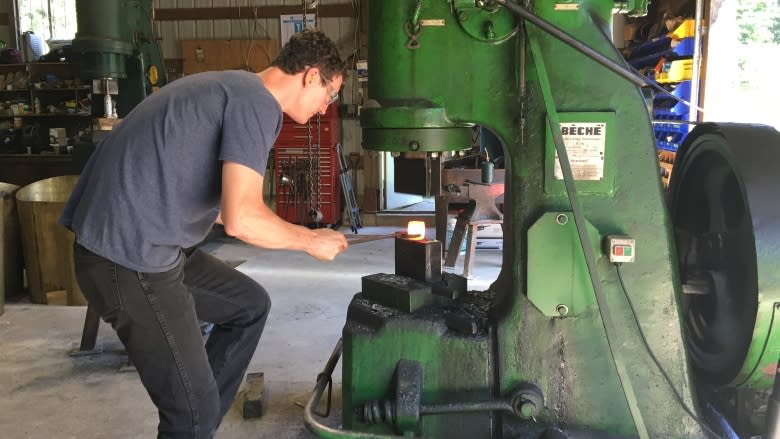'I didn't have any money to buy coal:' true confessions of a 13-year-old blacksmith
Timothy Dyck's love for blacksmithing was forged in his teenage years which he spent scrounging materials to fuel his passion.
Now 26, he's turned his childhood passion into a career and spends his days surrounded by antique machines, hammers and anvils at his Abbotsford, B.C. blacksmith shop, Forge Works.
"You can't really buy tools today that are for blacksmiths, so they're all old, which is great," he told North by Northwest's Jennifer Chen.
Dyck created his first piece, a medieval-style chain mail shirt when he was 13 years old and quickly became set on working with bigger pieces of metal and trying new techniques.
"As soon as I got started with actually hitting hot steel, forging steel, it was kind of like 'wow, this is amazing. This is what I want to do with my life,'" he said.
He said he was raised to build the things he needed if he couldn't afford to buy them, so that's what he decided to do.
With the help of his father, Dyck built his first forge and then started scavenging for scrap materials.
"I didn't have any money to buy coal," he said. Instead, he would ask around at construction sites for leftover wood and burn it into charcoal which would then be used in the forge.
When he looks back he wonders how odd it seemed to people that a 13-year-old boy would be wandering around construction sites and steel stores.
Still, before he even finished high school, Dyck was offered a job as a blacksmith at Fort Langley National Historic Site in an interpretive role.
Shortly after that, he spent four years apprenticing in Cranbrook, B.C. before returning to Abbotsford to open his own business.
'Incredibly rare' machine
Dyck said the art of blacksmithing hasn't changed much in the past century.
He still uses the same anvil he purchased at 13 years old after he spotted it in a front yard and convinced its owner to sell it to him.
A major source of pride in the shop is the six-tonne German powered hammer that Dyck said was made sometime around 1950, and with each of its powerful blows, saves Dyck about half an hour of manual hammering.
"They don't make these like this anymore. It's incredibly rare to have this machine," he said.
"It's a little bit tricky sometimes because I can't read the handles and knobs and stuff so you have no idea what it says," he said, chuckling.
Dyck said his parents were incredibly supportive of him following his passion and would help out by driving him to industrial supply shops and construction sites for materials.
"They might have realized it even before I did that this is what I wanted to do … It's definitely not an easy career to walk, so they have really supported me," he said.
Forge Works mostly deals with custom orders but Dyck also uses his creativity to come up with vases, bowls and candle holders.
He said there's a demand for handmade goods and compares it to the work of a fine tailor.
"You want it right and you want it to fit you and appreciate the time and energy that goes into it," he said.
With files from Jennifer Chen and CBC Radio One'sNorth by Northwest



